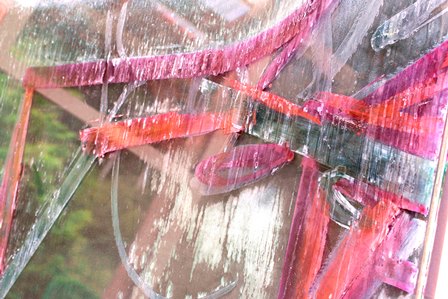Innovative developments and conservation concepts for architectural glass

Crystalline deposits fog the painted glass panes like a white veil. © K. Selsam-Geißler, Fraunhofer ISC
Conservation concept for the glass façade of the public swimming pool building at Stuttgart Feuerbach
The concept was designed by a team of researchers from the International Convention Center for Cultural Heritage Preservation IZKK which is part of the Bronnbach Branch of the Fraunhofer ISC. The façade of the public swimming pool building at Stuttgart Feuerbach features a double glazing which displays obvious signs of corrosion. Of particular concern are the colored glass elements which were painted by the artist HAP Grieshaber between 1959 and 1964.
In order to prevent further damage to the artistically valuable façade, the authorities in charge (Hochbauamt Stuttgart) commissioned the Fraunhofer ISC to design a suitable conservation concept and also to develop an effective protection coating for subsequent conservation of the restored façade.
To find the best suited long-term concept for cleaning, restoring, and conserving the glass paintings, the IZKK researchers analyzed sample panes of the façade glazing. Analysis methods included light microscopy, cross section preparation and a combination of X-ray spectroscopy and scanning electron microscopy. An unpainted sample glass pane was used to determine the composition of the glass and to analyze the glass surface, the composition of the paint was analyzed from a painted glass pane.
The investigation revealed crystalline deposits of calcium and sodium silicate compounds which fogged the pane like a white veil and so not only impaired the view but also covered the color paintings. The leaching took form in massive glass corrosion between the double glazing. In some areas the corrosion depth reached 20 micrometers. The edge seal of the insulating glass had given way and so made room for condensation between the panes of the double glazing. Glass components began to leach out and corrosion products to accumulate, until the surface of the glass was partly dissolved.
Based on these results, a tailored concept was designed to carefully clean the façade without affecting the color paintings. The IZKK team then went on to develop a special protection coating which they tested on self-made glass samples matching the façade elements. These measures are meant to preserve the transparency of the façade and to improve the »readability« of the glass paintings. In order to prevent further corrosion, the façade panes are to be reincorporated into double glazings using latest standards and technology.
Glass finishing and coating
Apart from such glass conservation concepts, Fraunhofer ISC develops functional coatings for architectural glazings. Dust-repellent and anti-reflective properties can be combined in one single coating. The coating creates a special glass surface structure which provides for self-cleaning through wind and rain. This finishing system has already stood the test of time on external glazings of the Cologne Cathedral. Another special coating was developed for window panes to improve the lighting condition of indoor rooms. The coated window panes promote the passage through the glass of those wavelengths of light that govern our hormonal balance and have a positive effect on our biorhythm.
Indoor climate control is another important research topic of the Fraunhofer ISC. A recent development features highly porous glass flakes which can absorb, store, and release excess moisture to regulate indoor air humidity. Incorporated into plaster or wall paint, the glass flakes help maintain a comfortable indoor climate and prevent mildew and mold.
Media Contact
All latest news from the category: Trade Fair News
Newest articles

Redefining Cancer Science: Rodents, Humans, and the PD-1 Puzzle
Results of a comprehensive analysis refute assumptions that a key immune checkpoint receptor functions the same in rodents and humans The Discovery of PD-1: A Milestone in Cancer Treatment Since…

Heart Surgery Risks: Low BP Linked to Postoperative Kidney Injury
First large cohort study at the Heart and Diabetes Center NRW awarded – Hilke Jung presents research project at the FoRUM conference of the Ruhr University Bochum A working group…

Microbial Secrets: Boost Plant Growth with the Power of Soil Bacteria
To stay healthy, plants balance the energy they put into growing with the amount they use to defend against harmful bacteria. The mechanisms behind this equilibrium have largely remained mysterious….



